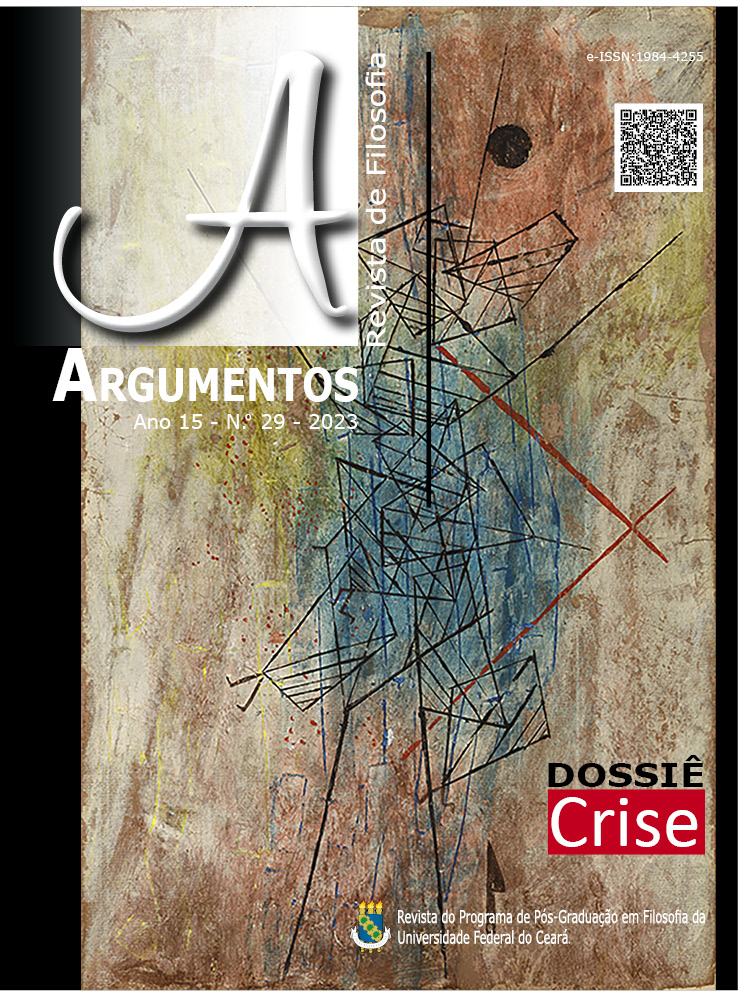The crisis of the sciences in Husserl: from naturalistic nonsense to forgetting of the “original soil” of scientific idealizations
DOI:
https://doi.org/10.36517/Argumentos.29.5Keywords:
Edmund Husserl. Science crisis. Naturalism. Ideal of technique. Pre-scientific world.Abstract
The present paper focuses on the theme of crisis and more specifically on the crisis of the science in Husserl. Divided into two parts, the paper initially approaches the subject in question through Husserl's critique of the presuppositions of the naturalist doctrine, the ground on which the positive sciences of nature are based. In a second moment, the paper shows that the crisis of the sciences would result from a slippage in the meaning of Geometry and more particularly from a fundamental forgetfulness of the pre-scientific world, through which the sciences would lose sight of their original relationship with the world, leaving behind the forgotten foundation of meaning of the natural science.
References
BACON, F. Novum Organum. Aphorisms concerning the interpretation of nature and the kingdom of man. Great Books of the Western world. Francis Bacon. Chicago; London: Encyclopaedia Britannica, INS, ([1726] 1971).
BANFI, M. A. Husserl et la crise de la civilization européenne. Cahiers de Royaumont, Husserl. Paris: Les Éditions de Minuit, 1959.
GALILEO GALILEI. Il Saggiatore. In: Opere di Galileo Galilei. Vol. VI. Edizione Nazionale a cura et labore di A. Favaro. Firenze: Giunti-Barbera, ([1623] 1966).
HUSSERL, E. Allgemeine Erkenntnistheorie – Vorlesung 1902/03. Husserliana: Materialien (Band III). Dordrecht: Springer-Science + Business Media, BV ([1902/1903] 2001).
HUSSERL, E. “Die Krisis des europäischen Menschentums und die Philosophie”. In: Die Krisis der europäischen Wissenschaften und die transzendentale Phänomenologie. Husserliana. Band VI. Netherlands: Martinus Nijhoff, ([1935] 1976).
HUSSERL, E. Die Krisis der europäischen Wissenschaften und die transzendentale Phänomenologie. Husserliana. Band VI. Netherlands: Martinus Nijhoff, ([1936] 1976).
HUSSERL, E. Einleitung in die Logik und Erkenntnistheorie – Vorlesungen1906/07. Husserliana (Band XXIV). Dordrecht: Martinus Nijhoff, ([1906/1907] 1984).
HUSSERL, E. Erneuerung. Ihr Problem und ihre Methode (1923). In: Aufsätze und Vorträge (1922-1937). Husserliana. Band XXVII. Dordrecht; Boston; London: Kluwer Academic Publishers, ([1923] 1989).
HUSSERL, E. Erste Philosophie (1923/1924). Erster Teil. The Netherlands: Martinus Nijhoff, ([1923/1924] 1956).
HUSSERL, E. Fichtes Menschheitsideal (Drei Vorlesungen 1917). In: Aufsätze und Vorträge (1911-1921). Husserliana. Band XXV. Dordrecht; Boston; Lancaster: Martinus Nijhoff Publishers, ([1917/1918] 1987).
HUSSERL, E. Formale und transzendentale Logik. Versuch einer Kritik der logischen Vernunft. Tübingen: Max Niemeyer Verlag, ([1929] 1981).
HUSSERL, E. Logische Untersuchungen. Erster Band. Prolegomena zur reinen Logik. Halle a. d. S.: Max Niemeyer, ([1900] 1913).
HUSSERL, E. Philosophie als strenge Wissenschaft. In: Logos: Zeitschrift für systematische. Philosophie / Logos, 1910-1911, 53 Seite (n), pp. 289-341.
KEKEL, L.; SCHÉRER, R. Husserl, sa vie, son oeuvre (avec un exposé de as philosophie). Paris: Press Universitaire de France, 1964.
LEIBNIZ, G. Monadologie. In: Principes de la Nature et de la Grâce. Monadologie et autres textes 1703-1716. Paris: GF-Flamarion, ([1714] 1996).
McCORMICK, P.; ELLISTON, F. Selected Letters. In: McCORMICK, P.; ELLISTON, F. Husserl, shorter Works. Notre Dame, Indiana: University of Notre Dame Press, 1981, pp. 352-364.
MORUJÃO, A. F. Husserl e a filosofia como ciência rigorosa. In: MORUJÃO, A. F. Estudos Filosóficos – Vol 1. Lisboa: Imprensa Nacional; Casa da Moeda, pp. 147-156.
RIZZACASA, A. The Epistemology of the Sciences of Nature in Relation to the Teleology of Research in the Thought of the Later Husserl. In: The Teleologies in Husserlian Phenomenology. Analecta Husserliana (Volume IX). Editor: TYMIENCKA, A.-T. Dordrecht/ Boston/ London: D. Reidel Publishing Company, 1979.
Downloads
Published
Issue
Section
License
Argumentos magazine is licensed under an International Creative Commons Attribution License.
The Magazine uses CC BY inclusion
1) The authors retain the copyright granted to the magazine or the right to initial publication, with the work regularly licensed under the Creative Commons Attribution, which allows the sharing of the work with acknowledgment of authorship and initial publication in this magazine.
2) The authors are authorized to contract additional applicable contracts, for non-exclusive distribution of the version of the work published in this journal (for example, publication in the institutional repository or as a chapter of the book), recognition of authorship and initial publication in this journal.
3) Authors are authorized and encourage to publish and distribute their work online (for example, in institutional repositories or on their personal pages) at any time before or during the editorial process, as they can generate productive changes, as well as increase the impact and reference of published work.




.jpg)










._._3.png)
1.jpg)
._._._.png)
